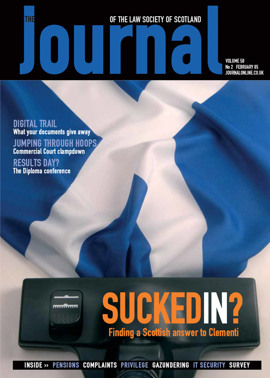Money claims on behalf of children
In the Journal for August 2004, pages 38-42, guidance approved by the Society’s Professional Practice and Civil Procedure Committees was reproduced. The guidance is for solicitors taking instructions from a child’s legal representative or guardian in relation to a money claim on behalf of the child. The following text should be substituted for the section on page 41 following the heading “Settlements or awards where there have been court proceedings (section 13)”:
Where, in any court proceedings, a sum on money becomes payable to a child under 16 the court may, but is not obliged to, make an order relating to the payment and management of the funds. Section 13 applies equally to awards made by the court and to extrajudicial settlements.
Accordingly, the solicitor must always consider whether it is necessary to make application to the court to consider the most appropriate method for administration of the money for the child. (It is also open to the defenders in court proceedings to make such an application.)
Under section 13(2) of the Act, the court may:
- appoint a judicial factor;
- order the money to be paid to the sheriff clerk (sheriff court);
- order the money to be paid to the Accountant of Court;
- order the money to be paid to the legal representative/guardian to be invested, applied or otherwise dealt with, under directions of the court for the benefit of the child;
- order the money to be paid direct to the child.
In normal course, an application to the court by the solicitor is only likely if there is reason to be concerned that funds will be dissipated or not applied in the child’s best interests. If the legal representative/guardian wishes to be appointed to administer the funds under the direction of the court, it will be necessary to satisfy the court that he or she will do so prudently and broad details will be required as to how the legal representative/guardian intends to discharge his or her responsibilities. The court may, for example, wish to know the extent to which the legal representative/guardian will seek professional advice in relation to the administration of the funds.
Most families will wish to avoid the appointment of a judicial factor because of the rigidity that imposes upon administration of the funds. It should be remembered that the cost of a judicial factor may form a legitimate head of claim in the proceedings.
It is only in very unusual cases that money would be paid directly to the child.
Applications to the court for administration of a child’s property under section 13 of the Act can be made by motion in the process of the action for damages or payment.
Section 13(2) of the Act does not lay down particular sums which would more appropriately be administered by the legal representative/guardian or the court/judicial factor. This is a matter for the court, to be determined in the light of all the circumstances of the case, the needs of the child, and the circumstances of the legal representatives/parents.
Applications to the court as to administration of a child’s property under section 13 of the Act are made by minute in the process of the action for damages or payment in accordance with the relevant rules of court.
In this issue
- Sell or transfer? (1)
- Promoting competition or competitiveness?
- Promoting competitiveness or competition?
- Not the final word
- Challenge of the FSA
- The pull of the south
- A world of change
- Finding the path
- An elusive model?
- Bank on it
- Trouble at t'mill
- Hidden evidence
- Money claims on behalf of children
- Secure connections
- Tread carefully
- Sell or transfer?
- Cracking the conflict code
- X Factor for success?
- Scottish Solicitors' Discipline Tribunal
- Website reviews
- Book reviews
- Is "gazundering" always bad?
- Defining the guideline






